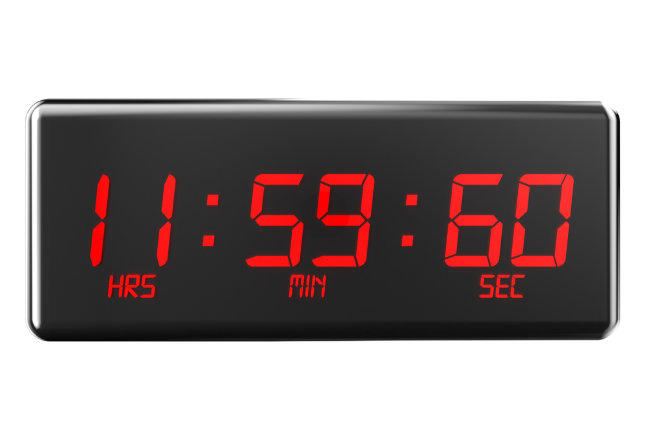
As you’ve likely heard, we’re about to experience a leap second this year; when the clock strikes midnight GMT, it will technically strike 11:59:60 before rolling over to midnight, an event that won’t happen for another five centuries. You might be curious, though, as to why we have a leap second, and it’s mostly to do with the arbitrary nature of timekeeping and the inarbitrary nature of physics.
First of all, Earth is subject to the laws of physics just like anything else and thus, its rotation is slowing down. Not quickly, mind you: Every hundred years, the days get 1/500th of a second longer. Still, that’s enough to screw up our half-assed time-keeping systems.
The 12-hour cycle has a long history; 12-hour clocks date back to ancient Egypt. Of course, they couldn’t measure time with quite the preciseness we can, and why we settled on 12 is up for debate. However, practically speaking, it didn’t matter much; the nice thing about Earth’s rotation is that it’s smooth and relatively consistent, so if you plopped a sundial out in a courtyard and drew some marks on it, you could rather reliably count on those marks to be in the same place every day.
And since it was easier and cheaper to just insist night was also divided into 12 hours, the ancient peoples of the world used timepieces like water clocks to measure time, and more or less stuck to that system for centuries. Ironically, precision made a mess of everything; as we got better at telling time and dividing it into minutes and seconds so we wouldn’t get lost at sea, it started to become clear that the days were getting just that little bit longer. In fact, our current calendar, the Gregorian calendar, was created because Pope Gregory XIII was getting annoyed that Easter wasn’t matching up with the spring equinox anymore.
But at this point, we’d invested thousands of years and pretty much every form of human endeavor in this method of timekeeping. So, in grand human tradition, we just made it fit, and the problem has actually only gotten worse. Our atomic clocks are so precise we’re handing out leap seconds left and right; one in 2012 crashed the internet for a few minutes. So as timekeeping gets more precise, and as Earth stubbornly refuses to violate the laws of physics, expect more leap seconds.
(Via rmg and History.com)
